Borat: Cultural Learnings of America for Make Benefit Glorious Nation of Kazakhstan
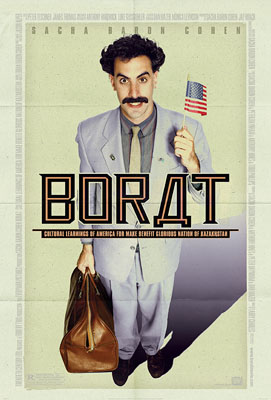
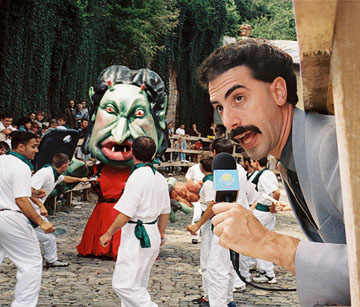 Set up in a documentary style, the film follows the exploits of a reporter from Kazakhstan named Borat (Sacha Baron Cohen) who is sent to New York City to film a movie that will hopefully provide valuable lessons to the people in his home country in how they can improve their daily lives by studying American culture. With his accompanying assistant, Azamat (Ken Davitian), at his side, Borat begins a whirlwind tour of the city and its people. Unfortunately, he becomes sidetracked the instant he happens to be watching television in his hotel room one night, and happens to see Pamela Anderson in an old episode of Baywatch. Borat becomes driven to the point of obsession with the blonde beauty, and literally changes his film's entire purpose in order to take a cross country trip to California in order to track her down and marry her. His single-minded mission will begin a perilous journey as Borat is introduced to black people, tries unsuccessfully to mingle with high society, and constantly offers his obscured and misinformed opinions about women and Jews to anyone who will listen.
Set up in a documentary style, the film follows the exploits of a reporter from Kazakhstan named Borat (Sacha Baron Cohen) who is sent to New York City to film a movie that will hopefully provide valuable lessons to the people in his home country in how they can improve their daily lives by studying American culture. With his accompanying assistant, Azamat (Ken Davitian), at his side, Borat begins a whirlwind tour of the city and its people. Unfortunately, he becomes sidetracked the instant he happens to be watching television in his hotel room one night, and happens to see Pamela Anderson in an old episode of Baywatch. Borat becomes driven to the point of obsession with the blonde beauty, and literally changes his film's entire purpose in order to take a cross country trip to California in order to track her down and marry her. His single-minded mission will begin a perilous journey as Borat is introduced to black people, tries unsuccessfully to mingle with high society, and constantly offers his obscured and misinformed opinions about women and Jews to anyone who will listen. Perhaps the most politically incorrect comedy to come out of a mainstream studio since 1999's South Park: Bigger, Longer and Uncut, Borat tries to offend just about everyone, regardless of race, religion or personal beliefs. The paper thin plot is simply an excuse to stage one sequence after another where Sacha Baron Cohen either walks up to someone on a street, or somehow manages to score an interview with an important figure, and then makes a mockery out of the person being interviewed. Many of the laughs come either from how misinformed about American culture Borat is, or the candid reactions of some of the people he talks to. Some of the film's highlights includes an extended sequence where Borat and Azamat make a stop at a Bed and Breakfast, and a fight that breaks out inside a hotel room, carries on into the halls of the building, and ends up at a certain formal meeting being held in another part of the building. The movie revels in bad taste and crude humor, almost daring the viewer not to gasp at some of the things that Borat says or does. (His opinions on Jewish people and women are bound to make some viewers squirm.) Wisely, however, the movie avoids falling into the pit of mean spiritedness. It does this mostly by making Borat completely clueless in the world outside his home. Borat is not a bad person, he is simply completely misinformed. He is willing to adapt, but has a hard time doing it, such as when he is given a chance to sing the National Anthem at a Texas rodeo, and decides to make some of his political views about the War on Terror known to the crowd. (The fact that the crowd at the rodeo actually cheers for many of his comments makes it all the more funny, and somewhat scary when you stop and think about it.) The movie may be completely tasteless, but it knows how to not go too far, while at the same time not make it feel like it's holding itself back.
Perhaps the most politically incorrect comedy to come out of a mainstream studio since 1999's South Park: Bigger, Longer and Uncut, Borat tries to offend just about everyone, regardless of race, religion or personal beliefs. The paper thin plot is simply an excuse to stage one sequence after another where Sacha Baron Cohen either walks up to someone on a street, or somehow manages to score an interview with an important figure, and then makes a mockery out of the person being interviewed. Many of the laughs come either from how misinformed about American culture Borat is, or the candid reactions of some of the people he talks to. Some of the film's highlights includes an extended sequence where Borat and Azamat make a stop at a Bed and Breakfast, and a fight that breaks out inside a hotel room, carries on into the halls of the building, and ends up at a certain formal meeting being held in another part of the building. The movie revels in bad taste and crude humor, almost daring the viewer not to gasp at some of the things that Borat says or does. (His opinions on Jewish people and women are bound to make some viewers squirm.) Wisely, however, the movie avoids falling into the pit of mean spiritedness. It does this mostly by making Borat completely clueless in the world outside his home. Borat is not a bad person, he is simply completely misinformed. He is willing to adapt, but has a hard time doing it, such as when he is given a chance to sing the National Anthem at a Texas rodeo, and decides to make some of his political views about the War on Terror known to the crowd. (The fact that the crowd at the rodeo actually cheers for many of his comments makes it all the more funny, and somewhat scary when you stop and think about it.) The movie may be completely tasteless, but it knows how to not go too far, while at the same time not make it feel like it's holding itself back.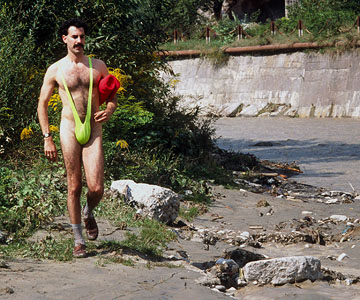 And yet, looking back on Borat, I cannot feel the same sense of enthusiasm I felt during certain scenes. This is a movie that's bound to fade from a viewer's mind shortly after viewing it, because there's simply not a whole lot of substance. It is simply a series of skits shot on a handheld camera where Cohen meets up with random people, loosely tied together by a plot that really has nothing to do with the movie itself. Many of the sequences concerning Borat's experiences in America are largely hit and miss. For everyone that hits big like the ones mentioned in the paragraph above, there are at least two more that fall flat. Some examples include a disappointing scene where a hitchhiking Borat is picked up by some college frat boys, and a sequence where he must take a driver's test that never really seems to build to anything, yet keeps on going for about three or five minutes. Director Larry Charles (TV's Curb Your Enthusiasm) also sometimes takes too long in setting up a joke that is all too obviously coming almost from the moment the scene starts. Many of the jokes are disappointingly predictable once we get to know what Borat as a character is like. This is the kind of movie that once you've figured out its pattern, it's kind of easy to figure out where the movie is going to go from there. This turns what is initially a fresh and hilarious comedy into somewhat of a routine one, since the movie seems content to trot out the same joke over and over, just in different ways.
And yet, looking back on Borat, I cannot feel the same sense of enthusiasm I felt during certain scenes. This is a movie that's bound to fade from a viewer's mind shortly after viewing it, because there's simply not a whole lot of substance. It is simply a series of skits shot on a handheld camera where Cohen meets up with random people, loosely tied together by a plot that really has nothing to do with the movie itself. Many of the sequences concerning Borat's experiences in America are largely hit and miss. For everyone that hits big like the ones mentioned in the paragraph above, there are at least two more that fall flat. Some examples include a disappointing scene where a hitchhiking Borat is picked up by some college frat boys, and a sequence where he must take a driver's test that never really seems to build to anything, yet keeps on going for about three or five minutes. Director Larry Charles (TV's Curb Your Enthusiasm) also sometimes takes too long in setting up a joke that is all too obviously coming almost from the moment the scene starts. Many of the jokes are disappointingly predictable once we get to know what Borat as a character is like. This is the kind of movie that once you've figured out its pattern, it's kind of easy to figure out where the movie is going to go from there. This turns what is initially a fresh and hilarious comedy into somewhat of a routine one, since the movie seems content to trot out the same joke over and over, just in different ways.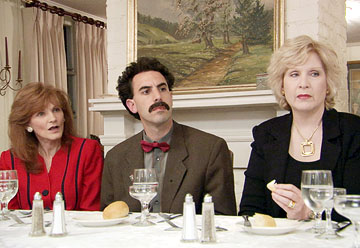 Needless to say, a little bit of Cohen's character goes a long way, and even at a breezy 80 minutes, Borat seems stretched out. There's simply not enough material here to support an entire movie, and not enough for us to care. It certainly doesn't help that the film seems to constantly be in a rush, leaping from one set piece to another, stopping only for a short narration from the main character now and then, reminding us that they're supposed to be on a cross country search to track down Pamela Anderson. With its severely fragmented nature and skit-driven source material, Borat would be much better suited for the smaller TV screen than a movie theater. Cohen, and even the character of Borat, got his big break on a TV series called Da Ali G Show, and it's quite clear watching this movie that television is a format much more suited for his style of humor. The movie is supposed to appear amateurish in style and tone, I am aware of this. And yet, at the same time, seeing something so small blown up on a big screen just seems wrong. It looks like something you should be watching in your easy chair late one night on HBO. I'm sure the DVD release will fix this problem, but while it's playing in theaters, Borat is just too small in scale and structure to make you feel like you're getting your money's worth for a theater ticket.
Needless to say, a little bit of Cohen's character goes a long way, and even at a breezy 80 minutes, Borat seems stretched out. There's simply not enough material here to support an entire movie, and not enough for us to care. It certainly doesn't help that the film seems to constantly be in a rush, leaping from one set piece to another, stopping only for a short narration from the main character now and then, reminding us that they're supposed to be on a cross country search to track down Pamela Anderson. With its severely fragmented nature and skit-driven source material, Borat would be much better suited for the smaller TV screen than a movie theater. Cohen, and even the character of Borat, got his big break on a TV series called Da Ali G Show, and it's quite clear watching this movie that television is a format much more suited for his style of humor. The movie is supposed to appear amateurish in style and tone, I am aware of this. And yet, at the same time, seeing something so small blown up on a big screen just seems wrong. It looks like something you should be watching in your easy chair late one night on HBO. I'm sure the DVD release will fix this problem, but while it's playing in theaters, Borat is just too small in scale and structure to make you feel like you're getting your money's worth for a theater ticket.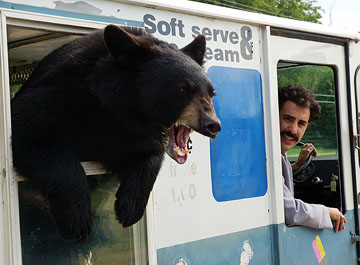
This brings me back to my original question - Does this movie deserve to be seen in theaters? Unless you are a die hard fan of Cohen, I would normally say wait for the DVD. My main hesitation is that given the amount of attention this movie has been getting, by the time it finds its way to DVD, your friends will most likely have spoiled most of the jokes for you already. While this would be a great disservice to the jokes in this film that do work, I simply cannot recommend you giving away your hard earned movie dollar to watching Borat. Yes, the movie has some big laughs, but it has no staying power, and leaves the viewer feeling curiously empty when it's all over. It's kind of like a joke you hear at a party that you think is funny at the time, but when you try to tell it to someone else later that same evening, it doesn't seem quite as funny as it did before. There's a lot to admire in Borat, but also a lot to be disappointed in, which makes it a largely uneven viewing experience, and one that is probably better suited for home.
See the movie times in your area or buy the DVD at Amazon.com!






0 Comments:
Post a Comment
<< Home